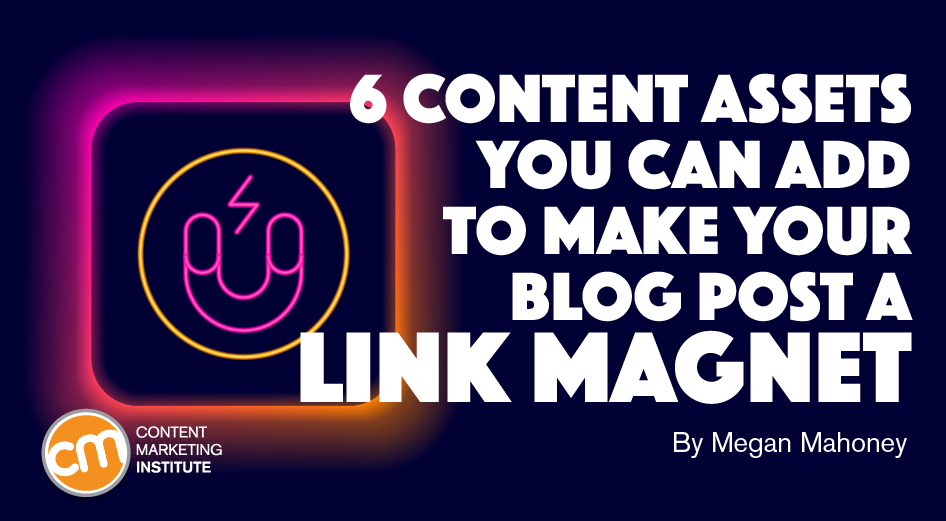MARKETING
6 Content Assets You Can Add To Make Your Blog Post a Link Magnet

Asking high-quality blogs to link to your content is a frustrating – and poor – link-building strategy.
You spend a lot of time sending the volume of pitches necessary to acquire a few, if any, backlinks. And frequently, those sites that do say yes aren’t high quality or even focused on your core topics.
A better strategy is to invest the time in crafting content that motivates other sites to link to in their text. Neil Patel did this for his guide to content marketing. Among the 338 sites linking to it are high domain authority sites like Moz, Substack, Buffer, Altervista, Impress, Copyblogger, Debutify, Quick Sprout, and Contently.

Don’t waste your time pitching sites to link to your #content. Invest the time in creating content that they’ll naturally want to link to, says mmahoney587 via @CMIContent. #SEO Click To Tweet
How do you create linkable content? I’ll share six types of assets that can help make your content a link magnet.
1. Templates
Incorporating a template into a blog post is an invitation to attract links. Other sites can provide your practical template to their audience without having to create one from scratch.
For example, Hootsuite crafted a 2,500-plus word article, How To Create a Social Media Content Calendar: Tips and Templates. Within the piece, it includes a link to download its social media calendar template.
The post has well over 3,000 backlinks from almost 1,000 unique domains, many of which have high domain authority.
Add templates to your #content like @Hootsuite with its social media calendar that earned over 3,000 backlinks, says mmahoney587 via @CMIContent. #SEO Click To Tweet

Though the article attracting links isn’t all about the template, a look at the use of the word “template” as anchor text in the linking content reveals it’s often the reason for the backlink.

TIP: To create a template, you can use a tool like Canva and then upload it as a fill-out-form PDF.
2. Tool
Another highly linkable asset is a tool. While content is a great way to show people how to perform a certain task, a tool that does it is even better.
If you’re a software company, publish a free feature of your tool. For example, when I looked among the top 10 linked pages on Serpstat, three mention tool in their page title:
If you mention or include those highly linkable tool features in your blog content, the article will be more likely to attract links.
If you don’t have a free tool from your product or services, get creative. For example, create a calculator to include in an article written about determining numbers. This article from Influencer Marketing Hub, which has 8,000 backlinks, includes a YouTube money calculator to estimate total earnings by channel and video:

Adding a relevant calculator into your content can boost the article’s backlinks, says mmahoney587 via @CMIContent. #SEO. Click To Tweet
3. Quiz
Another great way to add a linkable asset is to create a quiz. For example, Moz published an SEO quiz that has generated nearly 4,000 backlinks, according to Ahrefs.

Among the referring domains with high authority: FeedBurner, Search Engine Journal, Search Engine Land, Smart Insights, Impress, Super Office, Web Rank Info, Woobox, and Customer Think.

TIP: Tools like Typeform and LeadQuizzes can be helpful to create a quiz.
4. Original charts and infographics
Original images are another great way to generate links with little additional effort. Statistic-heavy posts can be ideal for original image creation.
For example, Oberlo creates images for statistics posts as you can see in this post about 10 email marketing statistics. It includes a graphic for each, including this one on the widespread usage of email (4.3 billion in 2022 and 4.6 billion by 2025).

The article netted over 130 backlinks with the anchor text being “image” indicating it was the graphics, not the text that attracted the links.

Infographics have a similar impact. For example, Neil Patel has a blog post on the psychology of color that includes an infographic about how color affect purchases:

The article has over 12,000 links, and I think the infographic is a major reason. (Note that the word “infographic” is included in the title.)

TIP: If you don’t have a designer on staff, you can use a tool like Canva to create them or hire a freelancer.
5. Quotes
Articles with experts and other sources can be a good way to attract backlinks – from the sources themselves or sites that want to use the cited material in their content.
Orbit Media is a master of using quotes in their posts. Here’s an example of their incorporation of a quote from industry expert Barry Feldman of Feldman Creative into their article on how to promote content:

The Orbit article has over 440 backlinks and 200+ referring domains, indicating some domains include the link on more than one page.

One of those linking to it was the marketing blog Single Grain. They used Barry’s quote in an article to support their point that content syndication is an effective content distribution method.

TIP: Here’s the email copy I use to reach out to potential sources to get their opinion on a topic – it’s short, references where I’ve seen their work, and invites them to contribute to the article:
Hi Chris,
I saw a post you wrote on SEJ about chatbots and your PPC strategy and really enjoyed it.
I’m currently doing an expert roundup on the future of chatbots in collaboration with Chatfuel, a no-code platform for Facebook, Instagram, and Messenger.
Would you consider answering a few quick questions? (Just a sentence or two for each- probably 5 minutes total.)
If so, we’d be happy to feature you on the blog (110k monthly visits) and a link to your website (DA 58). Here’s the link to the 5 quick questions.
Thanks,
Megan
TIP: If you don’t include original sources in your content, you can gather (and properly attribute) quotes from podcasts where the influencer appeared and crowdsource your content that way.
6. Internal links
Finally, if you only have a few minutes to spare, at least add some internal links to your post. Brian Dean of Backlinko recently mentioned internal linking is one of the most underrated tactics to boost a website’s authority. The key is to go back to your older articles that have earned links and add links from your new content.
Think about the links
To create content that attracts high-quality links organically, don’t waste your time pitching site after site asking them to link to your content. Instead, create great content that incorporates one or more of these six ideas to earn those links organically – and more successfully.
Which ones have you tried before, and which ones will you add to your calendar?
HANDPICKED RELATED CONTENT:
All tools mentioned in the article are identified by the author. If you have a tool to suggest, please feel free to add it in the comments.
Cover image by Joseph Kalinowski/Content Marketing Institute


















You must be logged in to post a comment Login